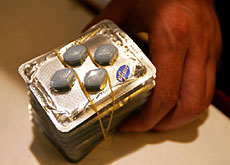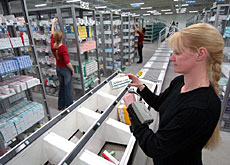Switzerland joins fight against fake drugs

Switzerland is taking part in a Europe-wide campaign to combat counterfeit drugs that pose a risk to the health of people who use them.
The problem will be discussed from Wednesday at a three-day Council of Europe meeting instigated by the Swiss Agency for Therapeutic Products, Swissmedic.
There have been two high-profile cases of counterfeit drug trafficking in Switzerland in the past three years.
In 2002 a wholesaler in the Basel region was caught selling repackaged drugs to Germany worth SFr23 million ($18 million).
And two years later Swiss customs seized HIV medicines that had been stolen from a batch sent to Africa by the World Health Organization.
Swissmedic is also concerned about the quantity of fake drugs available on the internet.
The Swiss regulatory authority proposed the Council of Europe meeting two years ago because the problem is not just confined to individual countries.
“This is a Europe-wide problem, which means we have to collaborate,” said spokesman Paul Dietschy.
“Some countries need to change their laws because this is not illegal in all countries. We also need to solve problems with data protection that stops us getting information,” he told swissinfo.
Dietschy hopes the programme of workshops and presentations at the Council of Europe headquarters in Strasbourg will lead to a coordinated effort to combat the problem.
Patients and doctors
The event will be attended by representatives of all 46 Council of Europe member states together with healthcare professionals, patients’ organisations and representatives from the pharmaceutical industry.
“We need a collaboration between customs, justice authorities and police on the one hand and the drugs industry, including manufacturers, wholesalers and medicine agencies on the other,” said Dietschy.
“We must educate doctors and pharmacists and connect the industry to the authorities.”
He added that the problem of counterfeit drugs was relatively new in Europe, but has been growing steadily over the past five years.
“This has been going on in developing countries for many years, but it is a new problem in Europe since the beginning of the 21st century. There have been about 15 big cases in Europe that we know of. There is big money involved.”
The Council of Europe estimates that drugs that have been deliberately and fraudulently mislabelled are on the rise.
“They present substantial health risks to Europe’s citizens, including potential fatalities,” the council said in a statement ahead of this week’s meeting.
swissinfo, Matthew Allen
The Council of Europe estimates that fake drugs make up 6% to 20% of the market share in member states.
The three-day conference will be held in Strasbourg from September 21-23.
It was organised on the instigation of the Swiss Agency for Therapeutic Products, Swissmedic.

In compliance with the JTI standards
More: SWI swissinfo.ch certified by the Journalism Trust Initiative


You can find an overview of ongoing debates with our journalists here. Please join us!
If you want to start a conversation about a topic raised in this article or want to report factual errors, email us at english@swissinfo.ch.